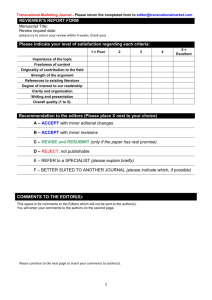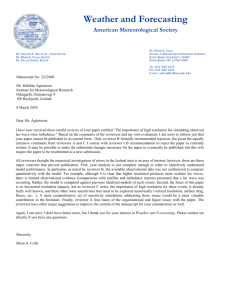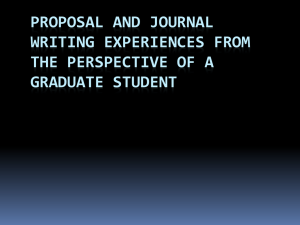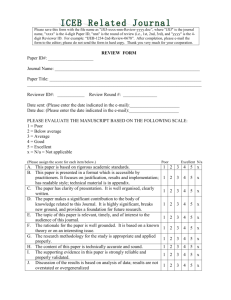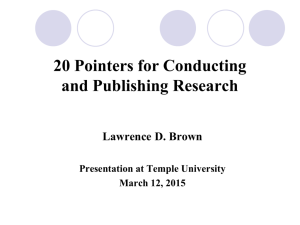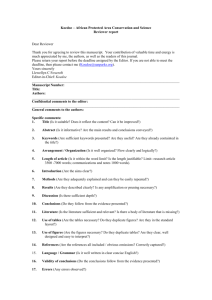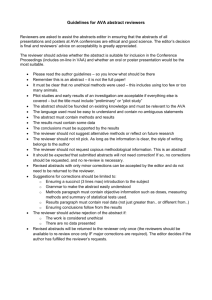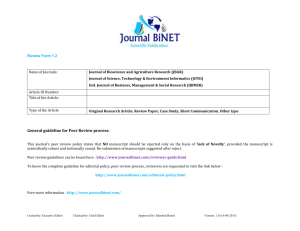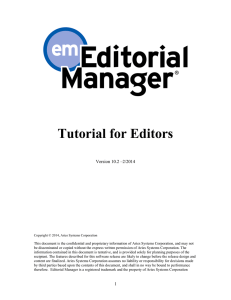Getting Your Research Published
advertisement
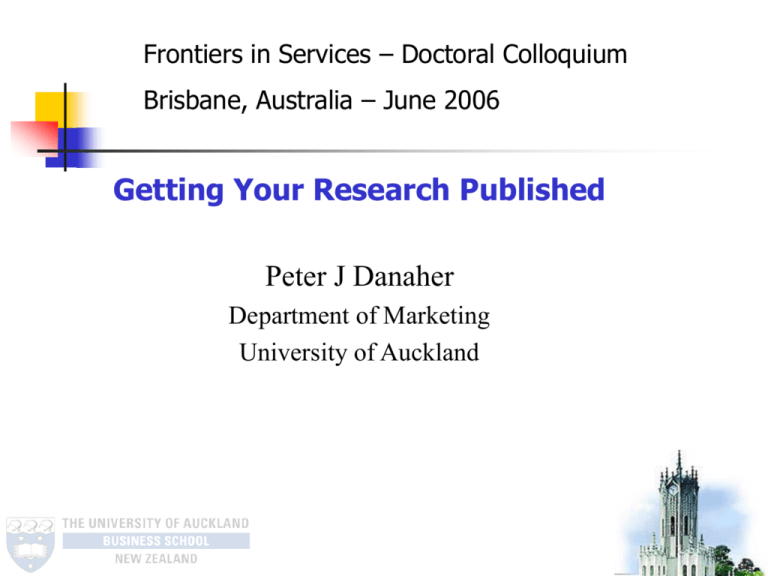
Frontiers in Services – Doctoral Colloquium Brisbane, Australia – June 2006 Getting Your Research Published Peter J Danaher Department of Marketing University of Auckland Outline Why publish? Research process Format for a paper Getting the submission right Insights from the trenches Getting the revisions right How it’s done at JM Why Publish? Requirement for RQF or PBRF (publish or be damned) Personal satisfaction (pure pleasure) Establish a reputation and build a career (promotion) Build knowledge (save the world) How Does it Work? Do some research Write it up Send it to a journal Editor rejects the paper…. or invites a revision You revise and resubmit (possibly several times) Paper is accepted Paper is published That’s Easy – What’s All the Fuss About? Doing top-quality research is hard Writing a 30-50 page paper is a challenge Top journals (JM, JMR, JCR, Mkt Sci) accept only 10% of papers Review process is slow and frustrating Reviewers generally less knowledgeable about your work than you are What Makes Me Such a Smarty Pants? Published over 50 refereed articles JMR (6) Marketing Science (3) Journal of Marketing (1) JASA (1) JAR(6) Plus, JR, IJRM, EJM, JAMS and Marketing Letters What Makes Me Such a Smarty Pants? Editorial Board member for the Journal of Associate Editor for the Journal of Service Marketing Research, Journal of Interactive Advertising and the Australasian Marketing Journal. Ad hoc reviewer for Journal of Marketing Research, Marketing Science, Management Science, JCR, International Journal of Research in Marketing, Journal of Interactive Marketing, Journal of Forecasting Paper format Abstract Introduction Literature Review The Model/Theory Hypothesis Development (if appropriate) Data description Data analysis/results Discussion Conclusion, limitations and future research References, tables, figures Publishing from a PhD PhD work could be the best you ever do 3 years of effort Fewest distractions Plan to publish 3 articles from your PhD Build this into the structure of your PhD PhD is only the first step in publishing. It’s not the end of the road, rather, the beginning What Are the Secrets? Submission Target the right journal – were previous key papers published in this journal? Format your paper to that used by the target journal (including references) Get feedback before you submit the paper Make the Abstract and Introduction exciting and get your point(s) across Have something to say and communicate this What Are the Secrets? Submission Suggest/nominate reviewers (e.g., JM, JMR, JCR and Mkt Sci all ask for this) Look at the Editorial Board members, some will be reviewers Equally, gives names of those who may be antagonistic Talk the paper up a little in the covering letter Check spelling and grammar Attention to details such as section numbers, equations, notation, etc. Revisions –yuk! Submitting the paper is only the beginning But still do spend the time to perfect the original paper Revisions are inevitable Put as much effort into the revision as the original submission Turn it around quickly Revision Secrets Don’t ignore the reviewers or editor no matter how stupid they are Tailor your revision notes around the reviewer comments Number the responses or keep them in the same order as the reviewer comments Repeat the reviewer comments then respond to them Help the reviewer navigate through the revised paper by telling him/her where the changes are Revision Secrets Don’t forget to also respond to the editor If you disagree with a reviewer, explain this separately to the editor. This is a neutral person Make copies of reviewer responses for editor and each reviewer. It’s amazing how often paperwork gets mixed up in the review process If using electronic submission, watch out for glitches Comments from the previous JM editor, Ruth Bolton Normally sends a paper to 3 reviewers, one of them an author-nominated reviewer and one not a specialist in the topic Will decide on outcome after at most 2 revisions No third revisions, no appeals unless a paper is ‘new’ Recognizes that review process is ‘noisy’ Believe it or not, feels bad about 90% of papers being rejected Meet the Editors (vicariously) Recent Mkt Sci conf had editors of 11 marketing journals, including the top 4 Never submit a paper before it is ready Remember to respond to the Editor’s letter If you are unsure is a paper is suitable for their journal, you can ask b4 submission Editors are competitive with each other Consider putting your working paper on SSRN.com to protect your IP Conclusion Research - the old adage of 10% inspiration and 90% perspiration still applies Editors and reviewers are on the lookout for good ideas, but don’t dismiss the details Maintain the required hygiene Work on your writing Don’t give up
